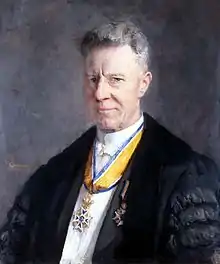Hendrik Zwaardemaker | |
|---|---|
 | |
| Born | 10 May 1857 |
| Died | 19 September 1930 (aged 73) |
| Scientific career | |
| Fields | Physiology |
| Institutions | University of Utrecht |

Hendrik Zwaardemaker (10 May 1857 – 19 September 1930)[1] was a Dutch scientist who invented the olfactometer in 1888.[2]
From 1897 to 1927 he was professor of Experimental Physiology at the University of Utrecht. In 1903 he became member of the Royal Netherlands Academy of Arts and Sciences.[3] In addition to his work on the sense of smell, he also conducted research on the human heart. He found that salts of potassium and other radioactive elements stimulated the heart.[4] His major work was "Die Physiologie des Geruchs" (Physiologie of Olfaction), it appeared in 1895.
Zwaardemaker Pairs
An important contribution of Zwaardemaker's studies is the concept of odor conjugates. Zwaardemaker discovered that certain odors could be prevented from detection by smell senses when mixed with various essential oils. These combination of odors are referred to as Zwaardemaker Pairs, (or Z-pairs).
| Offensive Odor | Common Odor Sources | Z-Pair Essential Oil | Active Ingredient |
|---|---|---|---|
| Butyric acid | Vomit, Flesh Decomposition, Rancid Dairy Products | Juniper Oil | |
| Chlorine | Vanilla | Vanillin | |
| Ammonia | Urine | Rose Oil | Ionone |
| Tobacco | Cigarette Smoke | Wintergreen Oil | Methyl salicylate |
| Musk | Bitter Almond oil | Benzaldehyde | |
| Rubber | Cedar Oil | ||
| Skatole | Feces, Coal tar | Cedar Oil | |
| Mercaptan | Natural Gas | Eucalyptus Oil | Eucalyptol |
References
- ↑ A. K. M. Noyons. Hendrik Zwaardemaker: 1857-1930. The American Journal of Psychology, Vol. 43, No. 3 (Jul., 1931), pp. 525-526
- ↑ Eibenstein, A.; et al. (July 2005). "Modern psychophysical tests to assess olfactory function". Neurological Sciences. 26 (3): 147–155. doi:10.1007/s10072-005-0452-3. ISSN 1590-1874. PMID 16086127. S2CID 23858823.
- ↑ "Hendrik Zwaardemaker (1857 - 1930)". Royal Netherlands Academy of Arts and Sciences. Retrieved 31 July 2015.
- ↑ "Heart Radioactivity". Time. December 9, 1929. Archived from the original on August 14, 2009. Retrieved 2007-01-15.